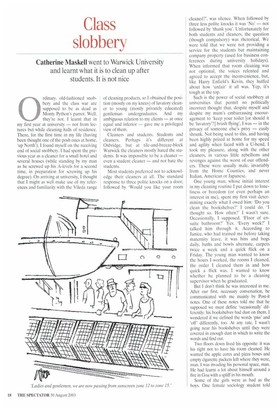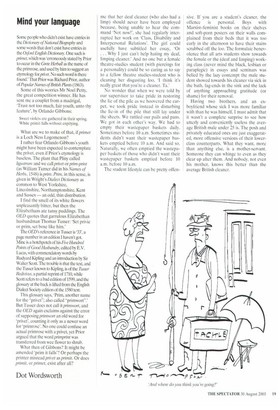Class slobbery
Catherine Maskell went to Warwick University and learnt what it is to clean up after students. It is not nice
0 rdinary. old-fashioned snobbery and the class war are supposed to be as dead as Monty Python's parrot. Well, they're not. I learnt that in my first year at university — not from lectures but while cleaning halls of residence. There, for the first time in my life (having been thought one of the posh ones at home, `up North'), I found myself on the receiving end of social snobbery. I had spent the previous year as a cleaner for a small hotel and several houses (while standing by my man as he screwed up his A-levels for a second time, in preparation for screwing up his degree). On arriving at university, I thought that I might as well make use of my references and familiarity with the Vileda range
of cleaning products, so I obtained the position (mostly on my knees) of lavatory cleaner to young (mostly privately educated) gentleman undergraduates. And my ambiguous relation to my clients — at once equal and inferior — gave me a privileged view of them.
Cleaners and students. Students and cleaners. Perhaps it's different at Oxbridge, but at tile-and-breeze-block Warwick the cleaners mostly hated the students. It was impossible to be a cleaner — even a student cleaner — and not hate the students.
Most students preferred not to acknowledge their cleaners at all. The standard response to three polite knocks on a door, followed by 'Would you like your room cleaned?', was silence. When followed by three less polite knocks it was 'No' — not followed by 'thank you'. Unfortunately for both students and cleaners, the question (though compulsory) was rhetorical. We were told that we were not providing a service for the students but maintaining company property (used for business conferences during university holidays). When informed that room cleaning was not optional, the voices relented and agreed to accept the inconvenience, but, like Harry Enfield's Kevin, they huffed about how 'unfair' it all was. Yep, it's tough at the top.
Such is the power of social snobbery at universities that permit no politically incorrect thought that, despite myself and despite my mum's embarrassing encouragement to 'keep your toilet [or should it be 'lavatory? brush flying', I was — in the privacy of someone else's privy — easily shrunk. Not being used to this, and having been highly prized at home for my speed and agility when faced with a U-bend, I took my pleasure, along with the other cleaners, in various little rebellions and revenges against the worst of our offenders. These were usually male, invariably from the Home Counties, and never Italian, American or Japanese.
One young man, whose initial interest in my cleaning routine I put down to loneliness or boredom (or even perhaps an interest in me), spent my first visit determining exactly what I owed him: 'Do you clean the bookshelves?' I could do. 'I thought so. How often?' I wasn't sure. Occasionally, I supposed. 'Floor of ensuite bathroom?' Yes. 'Every week?' I talked him through it. According to Janice, who had trained me before taking maternity leave, it was bins and bogs daily, baths and bowls alternate, carpets twice a week and a quick flick on a Friday. The young man wanted to know the hours [worked, the rooms I cleaned, the order I cleaned them in and how quick a flick was. I wanted to know whether he planned to be a cleaning supervisor when he graduated.
But I don't think he was interested in me. After our first, necessary conversation, he communicated with me mainly by Post-it notes. One of these notes told me that he supposed we must define 'occasionally' differently: his bookshelves had dust on them. I wondered if we defined the words 'piss' and 'off' differently, too. At any rate, I wasn't going near his bookshelves until they were covered in enough dust in which to write the words and find out.
Two floors down lived his opposite: it was his right not to have his room cleaned. He wanted the apple cores and pizza boxes and empty cigarette packets left where they were, man. I was invading his personal space, man. He had learnt a lot about himself around a fire in Goa with a spliff in his mouth.
Some of the girls were as bad as the boys. One female sociology student told me that her deaf cleaner (who also had a limp) should never have been employed because, being unable to hear the command 'Not now!', she had regularly interrupted her work on 'Class, Disability and Interpersonal Relations'. The girl could usefully have subtitled her essay, 'Or . Why I just can't help hating my deaf, limping cleaner.' And no one but a female theatre-studies student (with piercings for a personality) could be so caring as to say to a fellow theatre studies-student who is cleaning her disgusting loo, think it's really great that you're a cleaner. Ta.'
No wonder that when we were told by our supervisor to take pride in restoring the lie of the pile as we hoovered the carpet, we took pride instead in disturbing the lie-in of the pile that still lay under the sheets. We rattled our pails and pans. We got in each other's way. We had to empty their wastepaper baskets daily. Sometimes before 10 a.m. Sometimes students didn't want their wastepaper baskets emptied before 10 a.m. And said so. Naturally, we often emptied the wastepaper baskets of those who didn't want their wastepaper baskets emptied before 10 a.m. before 10 a.m.
The student lifestyle can be pretty offen
sive. If you are a student's cleaner, the offence is personal. Boys with Marxist–feminist books on their shelves and soft-porn posters on their walls complained from their beds that it was too early in the afternoon to have their stains scrubbed off the loo. The formulaic benevolence that all arts students show towards the female or the (deaf and limping) working class (never mind the black, lesbian or paraplegic) in essays and seminars was belied by the lazy contempt the male student showed towards his cleaner via sick in the bath, fag-ends in the sink and the lack of anything approaching gratitude (or shame) for their removal.
Having two brothers, and an exboyfriend whose sick I was more familiar with than he was himself. I must admit that it wasn't a complete surprise to see how utterly and conveniently useless the average British male under 25 is. The posh and privately educated ones are just exaggerated, more offensive versions of their lowerclass counterparts. What they want, more than anything else, is a mother-servant. Someone they can whinge to even as they clear up after them. And nobody, not even his mother, knows this better than the average British cleaner.



























































 Previous page
Previous page